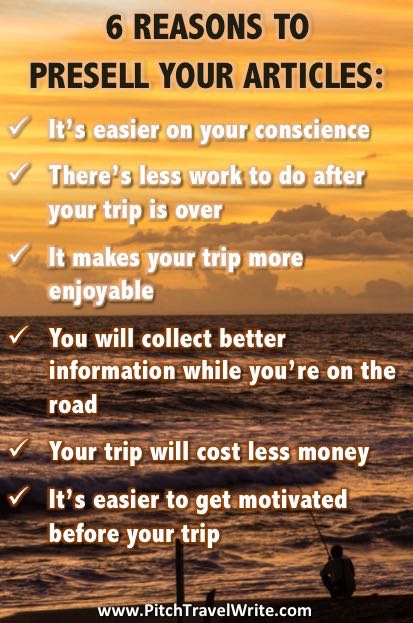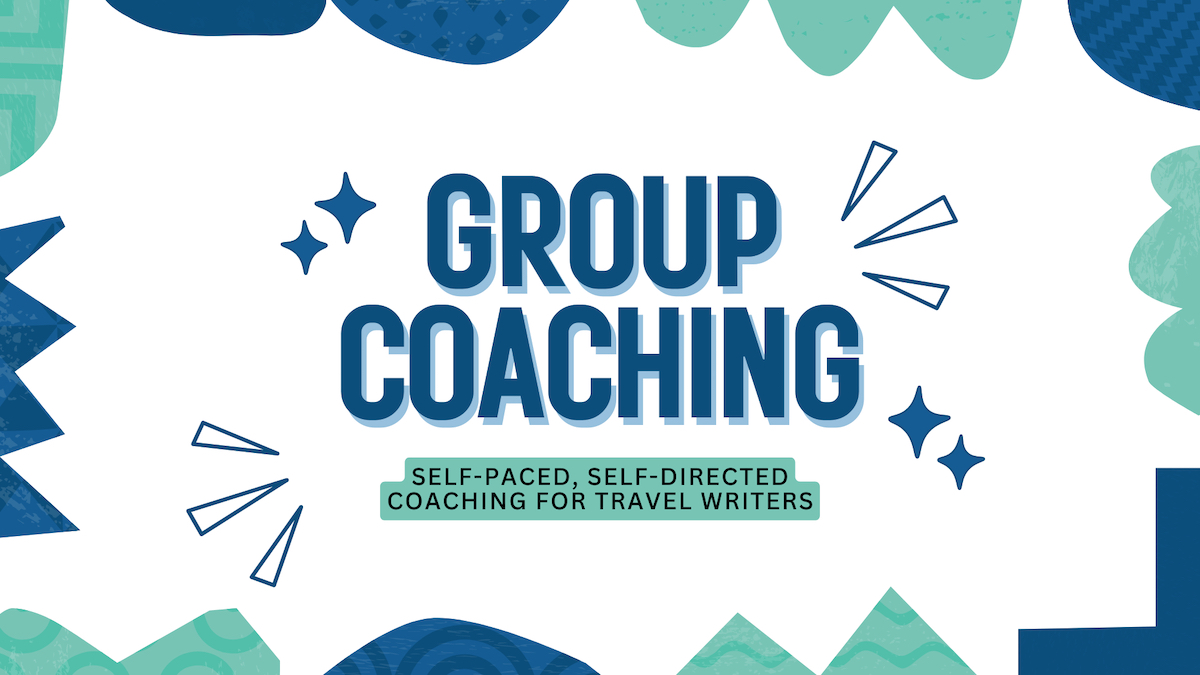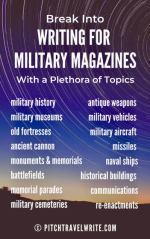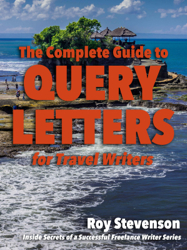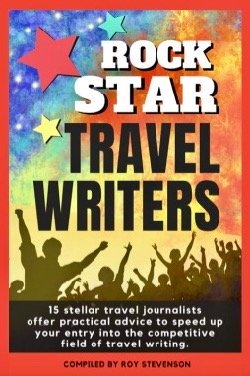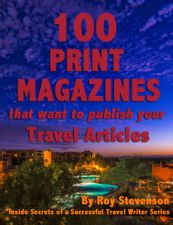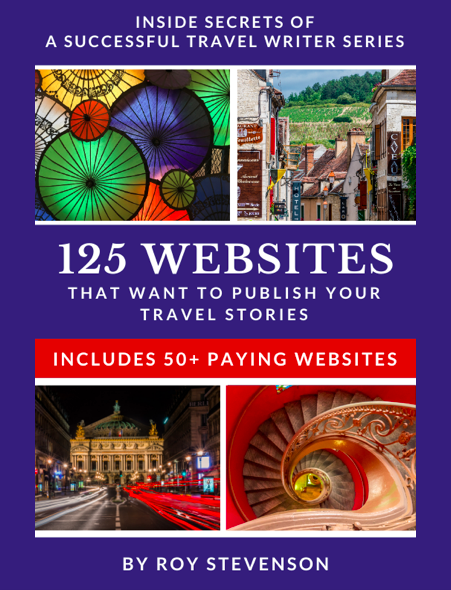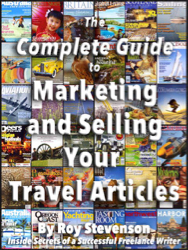- Home
- Pitching Travel Stories
- Presell Your Travel Stories
6 Reasons to
Presell Your Travel Stories
and How to Do It
By Roy Stevenson
My mantra is pitch before you travel. Presell your travel stories before you take the trip.
I know of many travel writers who go on a trip without an assignment. Then they're faced with trying to sell their story ideas after they return. I’m always surprised at this. It’s reactive and it’s not good business.
It’s very difficult to sell stories after you travel. Instead, get those assignment letters in advance. This approach is proactive and has many
benefits for you.
Here are 6 reasons why you should presell your travel stories:
It's Easier on Your Conscience When You Presell Your Travel Stories
If you travel without an assignment and request complimentary travel assistance, you are now committed to selling something after the
fact. That’s a hard thing to do. What if you can’t find a buyer?
Several times a year, I receive panic-stricken emails from writers who took a comped trip without an assignment. In exchange for the comped travel, they've committed to their hosts they will write an article and get it published.
When they're back home, they don't have any luck selling their article and they go into a
panic. They can’t find any outlets to publish their article.
Pre-selling your travel stories eliminates this risk.
You Have Less Work to Do After your Trip
First of all, you've done most of your research before you even take the trip. Plus, you know a lot more about a place before you arrive, so you're more productive while you’re there.
Second, it’s more efficient. Half the fun of going on a trip is planning all the things you want to see and do. You'll plan your trip more efficiently when you know in advance what you need to see and do.
Finally, anticipation sets your creative juices flowing. You're in the right state of mind for pitching travel story ideas before the trip, not after.
Your Trip is More Enjoyable
When you sell articles in advance, you have more control over your schedule and can design it around the attractions you want to see. This makes your trip more enjoyable.
You will also waste less time seeing random attractions because you know exactly where you need to go and more time seeing the things that are important for your assignments.
You Will Collect Better Information
When you presell your travel stories, you know what you need to see and do. Your assignments give you clarity and a sense of purpose.
And when you are engaged in the activities needed for your assignments, you will know exactly what information is beneficial while you're there because you already have the assignments.
Without pre-sold assignments you’re working in the dark. You don't know what stories you might sell later.
Preselling your stories turns the lights on. You'll take more relevant photos, you'll interview the right people, and you'll visit the attractions you need to see. When you get home you'll be ready to write your articles.
The Trip Will Cost You Less Money
You are highly likely to get complimentary entry to attractions, and other travel comps if you already have assignments. Although nothing is guaranteed, the way the industry works is to offer assistance to people with assignments.
In addition, with most assignments you will get paid for writing the articles for magazines. This helps to offset travel costs, too.
It's Easier to Get Motivated Before a Trip . . .
. . . and a lot harder to get motivated afterwards!
If you travel to a destination without assignments, you'll find it harder to get motivated to pitch story ideas after you return. The trip is over and so is the excitement.
If you only have a few vague story
ideas floating around your head, but nothing committed to a publication,
you’re not likely to do much work once you’re home. You’re tired, your
creativity wanes, and productivity slides once the trip is done.
To
be successful, it’s really a matter of putting in the time before you
travel to presell a handful of travel stories, versus racking your
brains afterwards for story ideas.
Slightly
restated, my mantra is: Get multiple assignments before you travel.
In other words, presell as many travel stories as possible.
Here's How to Presell Your Travel Stories:
Now
that I’ve told you why it’s important to pre-sell your story ideas and
secure those assignments before you leave home, here’s how to do it:
1. Select a destination that interests you.
A
destination that you’re passionate about will provide you with plenty
of potential story ideas. You'll enjoy doing your research before the
trip and the trip itself will be more enjoyable.
Turn down
invitations for press trips to destinations that aren’t interesting to
you. It doesn’t matter that they’re free. If you’re not interested in the
place, selling stories about it is
a chore.
2. When you’re researching your destination keep in mind your current outlets – the magazines, newspapers, online travel magazines, where that you’ve already been published.
Think, “Could I match up this aspect of the destination with any of my outlets?”
3. Research a variety of aspects about your potential destination.
Use
the Internet, guidebooks, or any other source of reliable information.
The more you can read about a place in advance, the more story ideas
you will generate and presell.
4. With your letters of assignments in hand, contact the Convention and Visitors Bureau at the place you want to visit. Tell them about your assignments and request their assistance with your itinerary.
Here’s an example:
 The Boneyard, Tucson, Arizona.
The Boneyard, Tucson, Arizona.My wife and I wanted to go someplace warm and sunny one winter a
couple years ago. We were brainstorming where we wanted to go when I
said I’d like to see The Boneyard, in Tucson, Arizona.
The
Boneyard is an enormous outdoor storage facility in Tucson, with more
than 4,000 aircraft. I knew I could sell an article about this place.
So I queried an aviation magazine that had previously published a couple
of my stories and got my first assignment.
Understandably, my wife wasn't so excited about this destination. So she researched things to do around
Tucson and found a free guide, “100 Things to Do Around Tucson” on a tourist website.
We both perused the document and marked all the things that interested us.
I
learned about Bisbee and Tombstone, that they were mining towns with an
interesting history. I had an outlet for these, Lost Treasure Magazine, with readers who enjoy searching for precious metals, visiting ghost towns and learning about mining
history. I pitched these stories to the magazine and got two more
assignments.
I also discovered that Fort Huachuca, down near the
Mexican Border, has several on-base museums about signals and communications, so
I pitched that story to a ham radio magazine that I’d written for, Popular Communications, and
got that assignment too.
Then, I found out that a new resort was
opening near Tombstone and pitched that idea to an online travel
magazine, GoNomad.com, and they committed to that story.
So, with a day’s
research and a flurry of query letters (which took 2 weeks of my time), I had five solid “Letters of Assignment”.
Armed with
these assignments, I approached the Tucson and Cochise County Convention & Visitor’s Bureaus. Within two weeks they came up
with a 12-day customized itinerary for us, including accommodations,
most meals, and complimentary entry and guided tours of the various
tourist attractions.

It was a memorable trip, and we were able to get out of the rainy Seattle winter for a couple of weeks. We saw all the attractions needed for the articles, plus a few things we wanted to do just for fun.
I delivered a handful of articles which pleased the CVBs
and our hosts. And I’ve been invited back to Arizona twice more since then
on other press trips.
If you have an assignment, or especially when
you have multiple assignments, the CVBs will want to work with you to
ensure your trip goes well and you have what you need to write good
stories.
The CVBs know their region intimately. Once they get
to know you and understand the types of articles you write, they will
suggest places to visit that you might not know about. That’s a big
help – it might even result in more story ideas to pitch once you’re
back home.
What if you’re just starting out and don’t have many outlets for your articles?
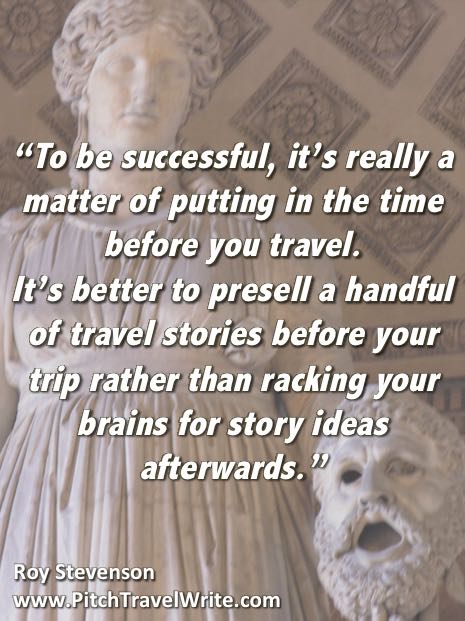
That’s
another advantage to preselling your story ideas before you travel.
There’s nothing to stop you, a beginner, from doing your research and
pitching any magazine in advance of your trip. It doesn’t matter that
they haven’t published your work (yet).
When I was a novice writer, I had great success with this method. When I am
planning a trip, I presell my articles by starting out my query letters
saying: “I’ll be visiting (name of city) next month, and would love to write an article about (the story idea) for your magazine”.
You
will not get assignments for every story angle you pitch. Even with my
acceptance rate of 90%, some story ideas are rejected. It’s no big
deal.
The idea is to fire out as many queries on different
story ideas to as many magazines as you can. It’s a shotgun approach,
and can work as nicely for you as it works for me.
How far ahead
should you start planning your trip?
For a regional tour in the United States,
start three to four months in advance. For international trips, start
five to six months before you are planning to travel.
Preselling
your story ideas with all this advance research and querying sounds
like a lot of hard work — and it is. But it will guarantee a
more enjoyable trip and some great stories to write about your
destination at the end of the trip. And you'll earn some money from your articles.
And because you did most
of the work in advance, you will enjoy the trip more because the only
thing left to do when you get home is write the articles. Presell your
articles before the trip. That’s easy!
There's no need to struggle with writing a query letter.
Here's a guide that tells you everything you need to know, along with 20 sample query letters that you can use as templates to help you write your own queries.
It's a steal at less than $20.
Related Articles that will also interest you:
Where Travel Writers Can Get Published
Getting Published: The Many Ways to Sell Your Stories
Five Travel Writing Tips for Beginners

Roy Stevenson is a professional travel writer and the author of www.PitchTravelWrite.com. Over the past ten years, he’s had more than 1000 articles published in 200 magazines, trade and specialty journals, in-flights, on-boards, blogs and websites and has traveled on assignment around the U.S. and to dozens of international destinations.
IF YOU ENJOYED THIS POST, GET UPDATES. IT'S FREE.
